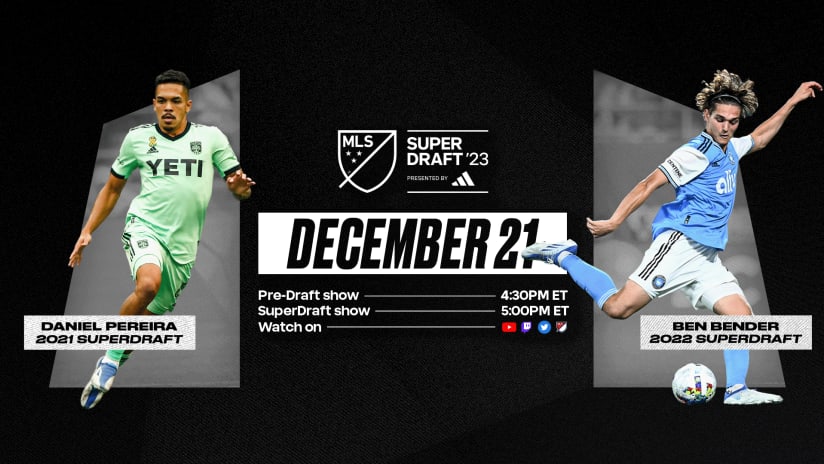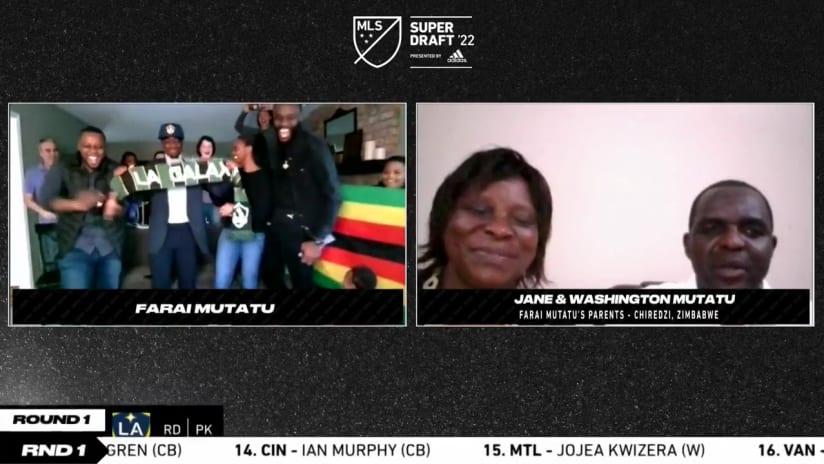Maryland playmaker and Japan native Tsubasa Endoh was selected No. 9 overall by Toronto FC at the 2016 MLS SuperDraft after earning MVP honors at the adidas MLS Player Combine.
Endoh's mother was in the crowd at the Baltimore Convention Center as he was selected, and he made sure to thank her for making the long trek. That's because home for Endoh is thousands of miles away.
He shared his story with MLSsoccer.com at the Combine.
FORT LAUDERDALE, Fla. – Tsubasa Endoh, the MVP of the 2016 adidas MLS Player Combine, has long been accustomed to living far away from home.
Endoh left his family at age 12 to move to Fukushima, Japan where he formed part of the first class of players at the Japanese Football Association (JFA) Academy, an elite residential program founded to better develop some of the top youth soccer players in the country.
On one Friday in March 2011, five years after Endoh moved to the academy in Fukushima, the midfielder remembers training with his teammates as his thoughts drifted toward the following week, when he and the rest of the squad would have to go through an exhausting fitness exam – the hardest part of their week.
Then, a little before 3 p.m., the ground started to move.
Endoh and his teammates raced toward the center circle, where they huddled together. Earthquakes are relatively common in Japan, and all the kids at the JFA Academy knew what to do when one hit. They got to the middle of the field and sat down, as far away from the huge light stanchions as possible.
The lights fell. Walls crumbled. After a few minutes, the earth finally stopped shaking.
Everyone on the team knew this was a big quake, bigger than any they’d ever experienced, but they didn’t yet know just how serious it was. So, as they got on their bus to head to the gym where they’d end up spending the night, talk turned to their upcoming fitness test.
“It was pretty scary, but I still remember after it happened we left the field and we got in the bus, and I don’t know, we were kind of excited,” he said. “We were going to be taking the physical test in a couple days, and we were talking about it like, ‘Are we going to do the physicals next week?’ And it turned out to be such a big, sad thing, but in the moment we didn’t know how serious it was. We thought it was funny, we thought we were getting out of our tests.”
The earthquake and the tsunami that followed devastated Japan. According to a March 2015 report from the Japanese National Police Agency, over 15,000 people died in the disaster and over 2,500 more are missing. Nearly a quarter million people were displaced from their homes.
Endoh and his teammates would have to leave Fukushima, too. The JFA facility wasn’t far from the Fukushima I Nuclear Power Plant, which had three meltdowns due to damage caused by the tsunami. The area was evacuated because of concerns about radiation, with the JFA temporarily closing the Fukushima facility where Endoh lived and trained.
“The nuclear stuff, the radiation, it’s invisible,” he said. “It was all kind of coming in, so we had to move down south.”
A little over a year later, Endoh moved to the other side of the world.
Coming To America
Before the earthquake and tsunami struck Japan, Endoh had already mapped out his future.
The JFA Academy requires all of their players to travel abroad during their time in the program, and Endoh chose to head to the US in the summer of 2010. He played at camps at Wake Forest and Maryland, and liked the setup in College Park.
Maryland head coach Sasho Cirovski liked Endoh, too, and he wanted to bring the 5-foot-7 creative midfielder to his team. He let Endoh know as much after the camp ended, but told him that if he wanted to play college soccer in the US, he’d have to improve his English.
Endoh got to work on learning the language, and, a couple of months later, Cirovski offered him a scholarship. He immediately accepted.
The earthquake and tsunami hit the next year, then passed. The destruction was immense, but life went on for Endoh. He was still committed to Maryland, and after graduating from the JFA program, he arrived on campus ahead of the 2012 season. But outside of the Terps coaching staff, he didn’t know a single person. His English wasn’t good, his knowledge of American culture almost non-existent.
Things weren’t so simple at the start. Endoh had worked on his English before heading to Maryland, but it wasn’t where it needed to be when he first arrived. He enrolled at the university’s Maryland English Institute as a freshman, and picked up the language quickly – he’ll graduate with a degree in sociology in the spring.
“It was kind of bad at first because I couldn’t make any friends and I had to adapt to a new environment, a new language, new food, different culture,” he said. “It was tough, it was really tough. I think it was one of the most challenging moments for me in my life, but as I overcame that, I think I got tougher as a person. I think I dealt with it well.”
The soccer came much easier. Endoh immediately fit in on the field, appearing in 20 games his freshman year. He became a full-time starter as a sophomore, starring in his team's run to the 2013 College Cup final. And he finished his senior season in 2015 third on the Terps with five goals and second on the team with six assists.
He was solid at the recent Combine, and has been projected as a potential second round selection in Thursday’s draft. The 5-foot-7, 140-pound midfielder isn’t big, but he impressed scouts with his playmaking ability in South Florida.
Now, five years after the earthquake hit and four years after he left everything behind to move across the world, Endoh would like nothing more than to run a few more fitness tests – this time as a pro.
“I didn’t expect myself to be at this level right now,” he said. “When I first came over to the USA, I had no idea where Maryland even was. I didn’t even know they were a Division I school when I first went to that camp.
“But now I’m here, I have a great chance to be a pro and I think I’ve experienced things that people don’t really get to experience. I think I should be proud of myself for adapting to a new environment, new culture, new food, new people, new language. It’s not done yet, but it’s been a good moment, a fun moment. A period I’ll remember for my whole life.”













